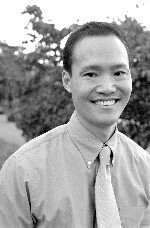DRHOOK- Humility: Why no doctor can know it all

Embarrassing things happen all the time in everyday life. I'm trying to play more tennis, and right now my skills are mediocre at best. Recently I chipped a shot beautifully into the backhand corner against my tennis buddy.
"Wow," I thought to myself, "that was a great shot!" My brief moment of glory ended when my opponent lobbed it back to me. (I hate lobs more than I hate influenza.) I don't know exactly what happened, but somehow I missed the ball during my "Roger Federer overhead smash." The tennis ball hit my forehead. Bonk!
My friend did his best not to laugh– or even smile. I told him he should laugh his head off because at that moment, I was no Venus Williams.
To be humble: a blessing or a curse?
In the academic world, ignorance– and in particular stupidity– are deadly sins. All through college and medical school, I took classes with competitive students who all wanted to be first in the class. One of my classmates used to say (lie), "Wow, I got a 95 on my test, and I didn't even study. What did you get?"
One of my medical school classmates complained he got an A instead of an A+ because that meant his dermatology career was officially over. (Yes, you need all A plusses to cure acne and do microderm abrasion.)
Then one day one of my mentors, who was smarter than Ben Franklin and Isaac Newton rolled into one, taught me something shocking: he didn't know everything. "Holy encyclopedia, Batman!"
He told his patient he didn't know the answer– but he said he would do his best to find out the answer. Although I have never taken a hallucinogen, I think my vision and hearing went on the fritz when I heard him say this.
"Ah, excuse me, but we aren't supposed to never admit we don't know something? Won't the medical board take away our license?"
Sure, we can see clogged coronary arteries and pump them open to reduce the risk of a heart attack. We can remove an inflamed appendix to reduce the risk of death if it bursts. We can give pain medicines to minimize a migraine headache. But there are times we don't know what the problem is and how to fix it. It doesn't mean we won't figure it out, but there might not be an answer right at that moment.
I never take credit for making a diagnosis if someone has seen a previous doctor who "missed it" because medicine involves a lot of trial and error. The adage, "If at first you don't succeed, try, try again," is very true in the medical field.
Everyone is different and responds differently to medicines and tests. Also, some diseases "blossom" over time, and a diagnosis can be made later. Sometimes a diagnosis can be made only after other things are ruled out. Sometimes the history isn't given completely ("Oh, I forgot to tell you that I drink 24 beers a night") or the doctor doesn't understand things ("Oh, your wife is a man! Okay, now I get it!").
Also let's be real. Not every medical problem out there has a name. Western and eastern medicine don't know all the syndromes and diseases that exist. Sometimes patients kind of have a little of this disease and a little of that disease– but never present the full criteria to make a diagnosis.
Personally, I hate not knowing everything, but it's impossible to know everything. Though I wish I were as smart as Stephen Hawking, I do know how to research things and when to refer.
Now all I have to do is learn not to hit overheads in tennis anymore.
~
Dr. Hook cracks a joke or two, but he's a renowned physician with a local practice and an interesting website, drjohnhong.com. Email him with your questions.
#
1 comment
And this is why we love you!!!!